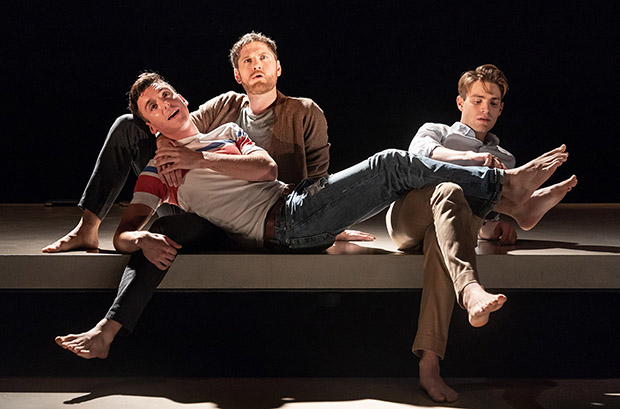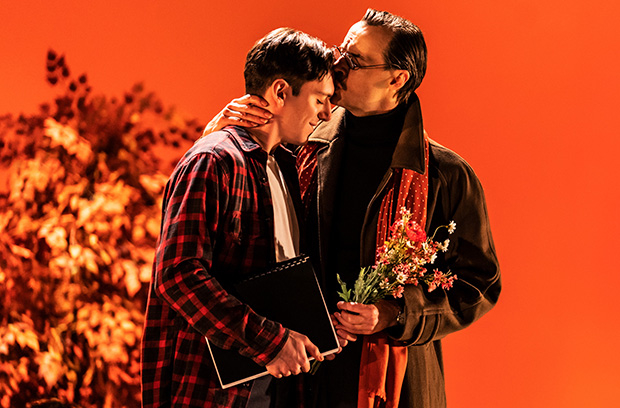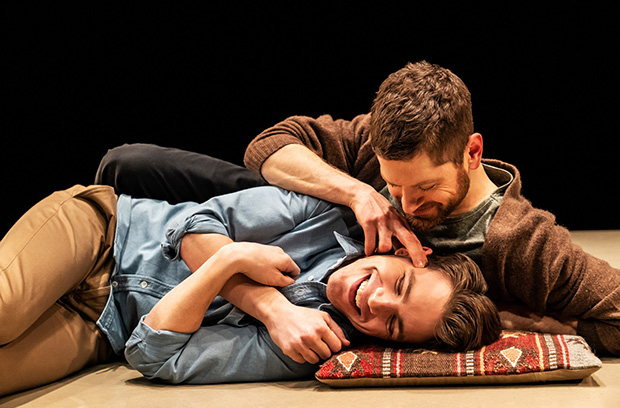Why Wasn't The Inheritance a Hit in New York?
The work had been deemed a successor to ”Angels in America”, but maybe expectations were the problem.

(© Matthew Murphy)
It was being positioned as the next Angels in America. Audience members across social media were hailing it as a "masterpiece." Reviewer Dominic Cavendish, writing for London's Telegraph, called it "perhaps the most important American play of the century so far." It received four Olivier Awards, including Best Play.
And then it came to New York.
Were it not for the coronavirus outbreak that forced the closure of all Broadway houses, Matthew Lopez's The Inheritance would have ended its run on Sunday, March 15, after a meager 138 performances at Broadway's Barrymore Theatre, likely a disappointment considering its imprimatur. This Story of the Week will look at how one of the most buzzed about properties in recent years became one of the industry's most surprising failures.

(© Matthew Murphy)
What Is The Inheritance?
The Inheritance is Lopez's contemporary rendering of E.M. Forster's 1910 novel Howards End, reset in New York City circa 2016. The play premiered at London's Young Vic Theatre in March 2018, before transferring to the West End's Noel Coward Theatre, where it completed a planned four-month run. The Broadway production opened on November 17, 2019, and tickets were on sale through June 7.
Told in two parts that each run more than three hours, The Inheritance follows the lives of Eric Glass (Kyle Soller) and Toby Darling (Andrew Burnap), a long-term couple who live in a rent-controlled apartment on the Upper West Side that Eric inherited from his grandmother. As Toby, a social-climbing playwright, becomes enamored of a life of sex, drugs, and fame, Eric befriends his dying neighbor Walter Poole (Paul Hilton), the partner of billionaire real estate developer Henry Wilcox (John Benjamin Hickey originally, now Tony Goldwyn).
When Walter dies, he leaves Eric the house that he and Henry own in upstate New York and that Walter had turned into a makeshift AIDS hospice at the height of the crisis. As the only person privy to this information, Henry must decide whether to actually give Eric the property, but, after they become friendly, Henry comes up with an idea of his own. Meanwhile, Toby has fallen in love with Adam (Samuel H. Levine), a rich, handsome actor in his play.
But that's just the bare bones of the sprawling plot and multitudinous themes contained within the play's nearly seven hours. The Inheritance looks at how far gay life has come since the crisis; what, if anything, the gay community owes to its forebears; and what role must be played in the lives of future generations.

(© Matthew Murphy)
Why Was The Inheritance Closing So Quickly?
Economics are likely, for starters. Stephen Daldry's production was capitalized at around $9 million and employs a principal cast of 15, along with seven understudies and 10 supernumeraries. The grosses started out OK — it earned $738,918 on a potential of $1.1 million in the week leading up to its opening — but they have swiftly declined as winter has taken hold. For the week ending February 9, it took in only $308,715, or 27 percent of its potential. It has consistently been one of the five lowest-grossing productions each week since 2020 began, and has played to houses that were rarely larger than three-quarters full for the entirety of its run.
The production was always going to be a risk. Two parts means two sets of tickets, and at Broadway prices, that's a big ask for potential audience members (though, conversely, it could have been a financial windfall for the producers had the show been successful). Requesting that people willingly devote either a full day or multiple days to see separate performances is an even bigger ask. That's probably why the production never made buying tickets to both parts a package deal like Harry Potter and the Cursed Child — a property that also started out in England but came to Broadway with much greater fanfare.
The Inheritance attempted to remedy the daunting nature of its storytelling by quietly rebranding the individual shows as The Inheritance and The Inheritance: Part 2 ("a second chapter that continues the story") during the winter. The website initially included the statement, "It is recommended that all audience members see both Parts of the play for the full experience and story of The Inheritance." Now, the site simply reads "The Inheritance and The Inheritance: Part 2 are separate and complete plays." (The second half consistently had fewer weekly performances than part one from the very beginning, implying that you needn't feel pressure to see it.)

(www.theinheritanceplay.com)
In some cases, good word of mouth can help a show that has yet to set the box office on fire. The Inheritance had its fans — I bawled my eyes out — but the conversations it inspired were not the kind the production wanted people to be having. Audience members and critics of color criticized the lack of intersectionality in Daldry's production: All five principal characters are white, and the artists of color in the production are relegated to ensemble roles. People were so surprised that Lopez, a Latinx writer, would paint on such a narrow canvas that he eventually defended his decision in a New York Times op-ed. ("I wasn't attempting to create a generationally defining work of theater that spoke for the entire queer experience," he wrote. "I think that if I had started with that intention, I never would have finished.")
Other journalists had major issues with the queer representation that did exist in the play. "If your six-and-a-half-hour gay play has two sex scenes, and both of them end with a character bleeding from his ass, it's hard not to feel like your six-and-a-half-hour gay play hates gay sex," former BuzzFeed writer Louis Peitzman said. That Soller, Burnap, Levine, and now Goldwyn, good as they are, are all heterosexual also did not do the production any favors in terms of cultivating good will among the gay community. (To that, Lopez told Entertainment Weekly at the time of opening, "As we were casting, we made overtures to out gay actors, many of whom passed on these roles.")
And then there were the New York critics, who simply surmised that it just wasn't a great play. While The Inheritance did receive its share of raves in its home country — our lead critic, Zachary Stewart, described it as "leaving thousands of theatergoers absolutely wrecked" — the response here was much more demure than it was across the pond. "Its breadth doesn't always translate into depth," for instance, isn't the kind of New York Times pull-quote you can hang on a marquee.

(© Matthew Murphy)
What Now?
In the weeks immediately following the closing notice, the grosses have risen only slightly, indicating that the news has not really spurred ticket sales, as it often does when a production prematurely ends its run. The best that producers wanting to burnish the play's reputation can hope for now are Tony nominations, and those are not guaranteed.
Perhaps if they had first brought The Inheritance to a nonprofit partner, like St. Ann's Warehouse or Brooklyn Academy of Music, the results would have been different. Or maybe expectations were just too high — how could they not be for a play being hailed as the spiritual successor to Angels in America?
"We are all extremely proud of this production and the 32 actors who bring this ambitious story to life eight times a week and honor the legacy of those we've lost to the AIDS epidemic," the producers said in a statement.
It's too bad that pride doesn't always equal success.

(© Matthew Murphy)







